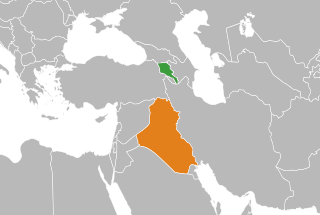Related Research Articles
On 21 April 2004, a series of large car bomb explosions ripped through Basra, Iraq. Seventy-four people died and more than 100 were injured. The attacks were some of the deadliest in southern Iraq since the fall of President Saddam Hussein.

Zakho, also spelled Zaxo is a city in the Kurdistan Region, at the centre of the Zakho District of the Dohuk Governorate, located a few kilometers from the Ibrahim Khalil border crossing. Zakho is known for its celebrations of Newroz.

Iraqi Armenians are Iraqi citizens and residents of Armenian ethnicity. Many Armenians settled in Iraq after fleeing the 1915 Armenian genocide. It is estimated that there are 10,000–20,000 Armenians living in Iraq, with communities in Baghdad, Mosul, Basra, Kirkuk, Baqubah, Dohuk, Zakho and Avzrog.
Chlorine bombings in Iraq began as early as October 2004, when insurgents in Al Anbar province started using chlorine gas in conjunction with conventional vehicle-borne explosive devices.

Tuz Khurmatu is the central city of Tooz District in Saladin Governorate, Iraq, located 55 miles (89 km) south of Kirkuk. Its inhabitants are predominantly Shia Turkmen, with a minority of Arabs and Sunni Kurds.
The 2007 Karbala bombings refer to a series of bombings in Karbala, Iraq in April 2007.
The 2007 Kirkuk bombings were a series of three suicide and car bomb attacks that occurred on July 16, 2007, in the northern Iraqi oil city of Kirkuk. The bombing killed 86 people with up to 180 injured.
On September 29, 2005, three near-simultaneous car bombs exploded in Balad, Iraq. The bombs went off in a busy vegetable market, by a bank and by a police station. More than 95 were killed and 100 wounded.
In 2003, there were 25 suicide bombings executed by 32 attackers.

This is the timeline of the Turkish-Kurdish conflict. The Kurdish insurgency is an armed conflict between the Republic of Turkey and various Kurdish insurgent groups, which have demanded separation from Turkey to create an independent Kurdistan, or to have autonomy and greater political and cultural rights for Kurds in Turkey. The main rebel group is the Kurdistan Workers' Party or PKK, which was founded on November 27, 1978, and started a full-scale insurgency on August 15, 1984, when it declared a Kurdish uprising. Apart from some extended ceasefires, the conflict has continued to the present day.
2004 was most notably marked by a series of battles in Fallujah. See Fallujah during the Iraq War.
On August 17, 2011, the Turkish Armed Forces launched multiple raids against Kurdistan Workers' Party (PKK) camps based in Iraq, striking 132 targets. Turkish military bombed PKK targets in northern Iraq in six days of air raids, according to General Staff.
Sharanish is an Assyrian village in Dohuk Governorate in Kurdistan Region, Iraq. It is located near the Iraq–Turkey border in the district of Zakho. The village has two Chaldean Catholic churches, Mart Shmune and Mar Kiriakos, both parishes' namesakes being patron saints of Sharanish.
The insurgency by the Kurdish Democratic Party of Iran surged in 1989, lasting until 1996, as part of the Kurdish separatism struggle. The eruption of the conflict in July 1989 was caused by the assassination of KDPI leader Abdul Rahman Qassemlou by suspected Iranian government agents. The most violent episodes took place in 1990 and 1991, when Kurdish soldiers launched massive attacks on Iranian military bases in Kurdish areas of Iran. This brought heavy retaliation from the Iranian government, aiming to eradicate the KDPI leadership by assassinating Sadegh Sharafkandi and other KDPI leaders in 1992 in order to disable the Kurdish party's ability to function. The conflict faded with the effective targeted assassination policy of Iran and by 1996 KDPI was no longer able to function militarily and announced a unilateral ceasefire. The conflict claimed hundreds of lives, mostly Iranian government troops and Kurdish militants.
The 13 June 2012 Iraq attacks were a series of simultaneous bombings and shootings that killed 93 people and wounded over 300 others. The attacks were carried out in seven different locations throughout Iraq.
This list is limited to bombings and does not include other forms of attacks.
The July 2016 Qamishli bombings were a twin car bombing in a Rojavan-held district in the city of Qamishli, part of the al-Hasakah Governorate in Syria. The bombings killed more than 44 and more than 171 were wounded. The Islamic State of Iraq and the Levant claimed responsibility. The city of Qamishli has been the site of multiple car bombings since 2015.
This is a timeline of events during the War in Iraq of 2013 to 2017 in its final year.

The following is a timeline of the history of the city of Zakho, Iraq.
On 20 July 2022, the Barakh tourist resort in the Zakho District of the Kurdistan Region of Iraq was shelled with four or five artillery strikes. The attack killed nine civilians, including two children, and injured 33 others.
References
- 1 2 "Car bomb kills at least 100 in Kurdish Iraq". The New York Times . Archived from the original on 2021-05-21. Retrieved 2021-05-21.